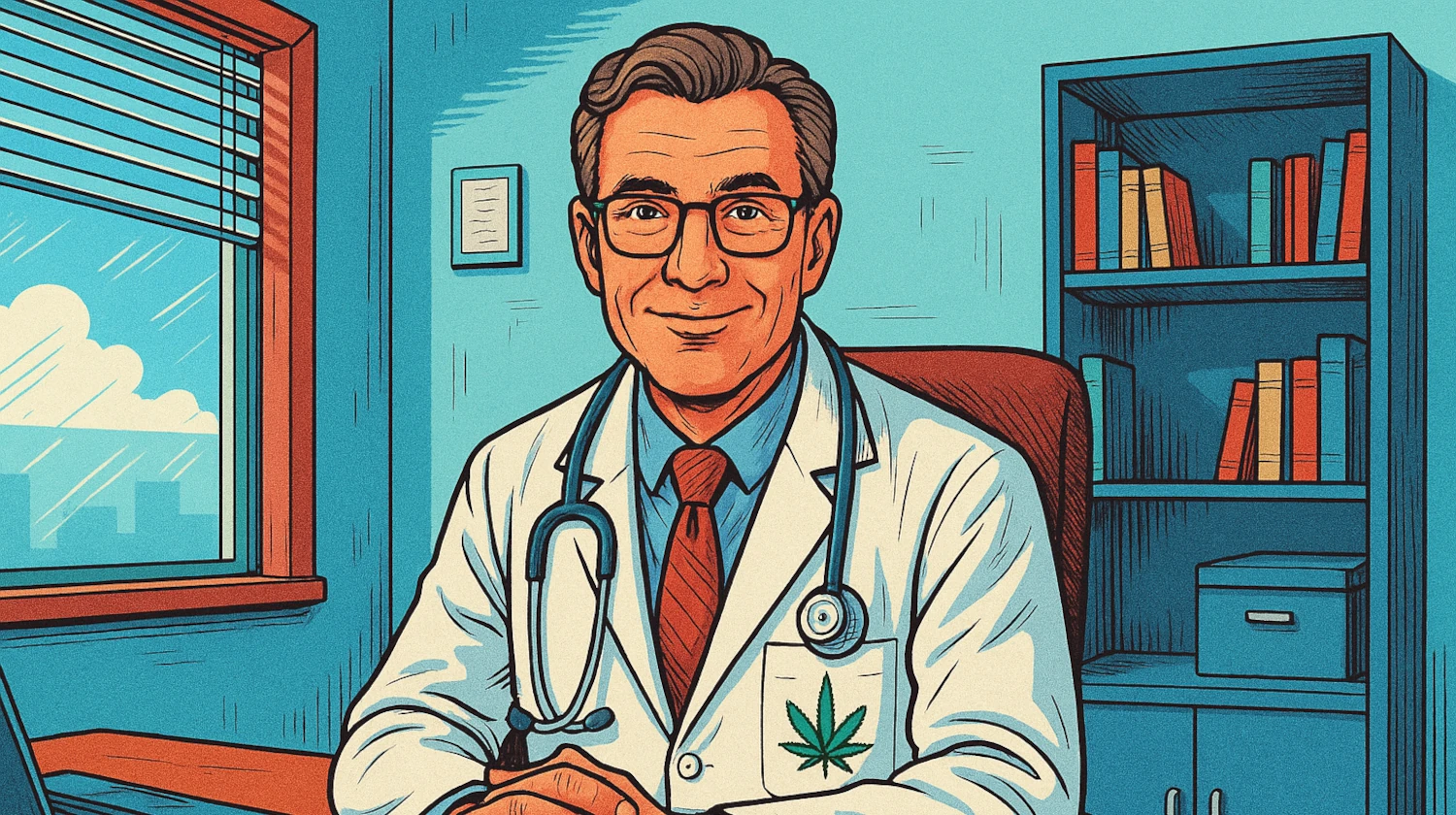In This Article
- What are Qualifying Conditions?
- How Can I Find My State's Qualifying Conditions?
- Can I Get a PTSD Evaluation for a Medical Card in My State?
- PTSD Listed in the Law
- PTSD Listed in Regulations
- PTSD Allowed by Rule
- Broad Discretion by Doctors
- If My State Doesn't Have PTSD As a Qualifying Condition, Can I Still Get a Medical Card?
- Do Any Symptoms of PTSD Count as Qualifying Conditions?
- References
Key Takeaways About Getting a PTSD Evaluation for a Medical Card
- Many states include PTSD as a qualifying condition for medical cannabis.
- States that don’t mention it specifically still may allow medical marijuana for PTSD based on its symptoms.
- Speaking to a medical cannabis doctor is the first step in getting a medical card.
Many individuals claim to find relief by using medical cannabis for their PTSD symptoms, so much so that numerous states have added it to their list of qualifying conditions to apply for a medical cannabis card. If you live in one of those states, you can get a PTSD evaluation for a medical card.
What are Qualifying Conditions?
Qualifying conditions are diseases or ailments that states decide are legal to treat with medical cannabis.1 The list can include anything from anxiety to terminal cancer. PTSD is a common condition found on these lists.
PTSD can form in anyone who has experienced a traumatic event. This condition features several symptoms and side effects that can include intrusive memories and flashbacks.
Those with PTSD often go to great lengths to avoid reliving or being reminded of their trauma, leading many to become avoidant of places, activities, and possibly individuals.
Persistent and negative thoughts are often typical, producing a feeling of profoundly negative or numb emotions in the patient. In many cases, patient behavior may become affected, leading to bouts of anger, substance abuse, and possible self-harm or suicide.
Some of the numerous physical, mental, and emotional symptoms of PTSD may include:
- Recurring, unwanted, or distressing memories related to one or more traumatic events
- Reliving the traumatic event (flashbacks)
- Upsetting dreams or nightmares
- Severe emotional distress or physical reactions
- Attempts at avoiding thinking or talking about the traumatic event
- Avoiding places, activities, or people to avoid remembering or reliving traumatic events
- Negative thoughts about self or others
- Feelings of hopelessness
- Difficulty maintaining close relationships
- Feelings of detachment from family and friends
- Lack of interest in previously enjoyed activities
- Difficulty experiencing positive emotions and/or emotional numbness
- Intense or prolonged emotional distress
- Easily startled or frightened
- Regularly feeling on guard or in danger
- Self-destructive behavior (e.g., excessive drinking, drugs, reckless driving, etc.)
- Irritability, angry outbursts, or aggressive behavior
- Persistent negative emotions (fear, anger, guilt, or shame)
- Emotional numbness or detachment
- Difficulty experiencing positive emotions
- Anhedonia (loss of interest in previously enjoyed activities)
- Trouble focusing or concentrating
- Difficulty remembering aspects of the traumatic event
- Changes in sleep patterns (insomnia or excessive sleep)
- Changes in eating habits (overeating or loss of appetite)
- Headaches, dizziness, or chest pain
- Gastrointestinal problems
- Chronic pain or other unexplained physical symptoms
For many, medical cannabis has helped deliver relief from one or more of these symptoms. While research is ongoing, many today feel that their PTSD symptoms can be managed or addressed with cannabis, leading numerous states to include PTSD on their list of approved medical cannabis conditions.
How Can I Find My State's Qualifying Conditions?

State cannabis program websites provide a breakdown of the rules, including the list of approved conditions, for its medical cannabis program. However, while some government websites are helpful and transparent about the rules, that is only the case with some states.
Whether the state is slow to update its web capabilities or needs to be more supportive of the medical program, finding basic information on government websites can be challenging.
Consumers should start by checking their state's medical cannabis program website. They should try calling or emailing their office if the website lacks the necessary information.
If all those efforts don't produce answers, consider checking some of the leading cannabis advocacy sites, like NORML, Marijuana Policy Project, and Americans for Safe Access, which often have updated and straightforward breakdowns of the rules surrounding medical marijuana for PTSD in each state.
Can I Get a PTSD Evaluation for a Medical Card in My State?
In America, the medical cannabis laws aren't always so clear. Each state and territory is allowed to determine its cannabis laws, including if PTSD is a qualifying condition. As of July 2024, the below states and U.S. controlled regions include PTSD in their medical cannabis program 2:
PTSD Listed in the Law
- Alabama
- Arkansas
- Colorado
- Connecticut
- Delaware
- Florida
- Hawaii
- Illinois
- Louisiana
- Maine
- Massachusetts
- Missouri
- Montana
- New Hampshire
- New Jersey
- New York
- North Dakota
- Ohio
- Oregon
- Pennsylvania
- Rhode Island
- Utah
- Vermont
- Washington
- West Virginia
- Guam
- South Dakota
- Kentucky
- Iowa (low-THC oil only)
- Mississippi
- North Carolina
- South Carolina (low-THC oil only)
- Texas (low-THC oil only)
- Georgia (for patients 18 years or older with PTSD resulting from direct exposure to or witnessing trauma)
PTSD Listed in Regulations
- Arizona
- Michigan
- Nevada
- New Mexico
PTSD Allowed by Rule
- Minnesota
Broad Discretion by Doctors
- California
- Maryland
- Massachusetts
- Oklahoma
- Virginia
- Washington, D.C.
If My State Doesn't Have PTSD As a Qualifying Condition, Can I Still Get a Medical Card?

Alaska is the only state medical program not to include PTSD as a qualifying condition in some form.
While not as straightforward, many can obtain cannabis for medical purposes through the adult-use market. In this case, any adult (of qualifying age determined by the state) can walk into a recreational dispensary and buy cannabis to treat their PTSD.
While this is not technically a medical program solution, many have utilized this method, especially in states where adult use is allowed. This method may prove beneficial in states like Alaska, where PTSD is not listed as a qualifying condition but does have an adult-use market.
Do Any Symptoms of PTSD Count as Qualifying Conditions?

Some PTSD patients may be unable to qualify through their state's program if they are not officially diagnosed with PTSD by a medical professional. There are some ways that a person can qualify for a medical cannabis card or receive medical cannabis without having PTSD approved as a qualifying condition in their state.
Some states allow symptoms to be placed in broader categories. Common symptoms such as anxiety, insomnia, chronic pain, and others may qualify an individual for the program. Additionally, some states allow applicants to petition for their case or their symptoms to be added to the state's program.
Individuals interested in qualifying through these means should visit their state program website or call the state program office to gain further clarity.
References
- Boehnke KF, Gangopadhyay S, Clauw DJ, Haffajee RL. Qualifying Conditions Of Medical Cannabis License Holders In The United States. Health Affairs. 2019;38(2):295-302. doi:https://doi.org/10.1377/hlthaff.2018.05266 ↩︎
The information in this article and any included images or charts are for educational purposes only. This information is neither a substitute for, nor does it replace, professional legal advice or medical advice, diagnosis, or treatment. If you have any concerns or questions about laws, regulations, or your health, you should always consult with an attorney, physician or other licensed professional.




